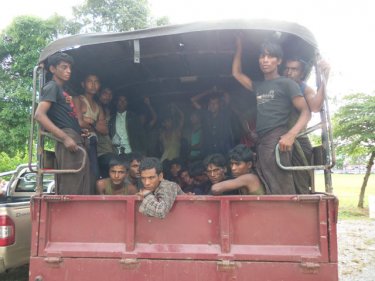For Public Use
Written Statement
by Mr. Benedict Rogers, East Asia Team Leader, Christian Solidarity Worldwide
to the
U.S. House of Representatives Foreign Affairs Committee
Subcommittee on Africa, Global Health, and Human Rights
Hearing on “The 2011 International Religious Freedom Report”
November 17, 2011
Chairman Smith, Ranking Member Payne, Distinguished Members of the Committee - firstly, thank you for the opportunity to submit evidence to this timely hearing. May I begin by expressing my deep appreciation for your leadership on these important issues of religious freedom and human rights. My colleagues in Christian Solidarity Worldwide join me in applauding your many years of dedicated work on behalf of those who are persecuted and oppressed for their faith, and we have greatly appreciated the opportunities over the years to work with you and your staff.
In looking at this year‘s International Religious Freedom Report, I would like to welcome the fact, as stated in the Introduction to the Report, that ―President Obama has emphasised the U.S. commitment to defend religious freedom in the United States and around the world‖ and that the United States recognises that religious freedom is ―an essential element‖ of a ―global commitment to advance human rights and promote national security‖. I welcome the expansion of training in promoting human rights and religious freedom at the Foreign Service Institute for officials from all U.S. agencies, and the formation of the Religion and Foreign Policy Working Group of the Secretary of State‘s Strategic Dialogue with Civil Society. Other countries, including my own, the United Kingdom, are now starting to increase their focus on religious freedom, but for many years the United States has led the way in putting religious freedom on the human rights agenda and others have much to learn from the experiences, policies and practices which have been pursued here.
In this submission, I will focus on the countries for which I am responsible, in the East Asia region, namely Burma, China, Indonesia, North Korea and Vietnam. My own personal expertise is in Burma, Indonesia and North Korea, and I have travelled regularly to these areas, but I oversee a colleague working on China and Vietnam, and have travelled to those countries as well.
Burma
Let me start with Burma. I have no disagreement with the IRF report on Burma, and simply wish to add some updates on developments in Burma in recent months. Many Buddhist monks, including U Gambira, whose case is noted in the IRF report, remain in prison. In the recent release of an estimated 220 political prisoners, no prominent Buddhist monks held in prison were freed. U Gambira is held in solitary confinement in Kale prison, and is reportedly seriously ill and in need of urgent medical care. He sustained serious injuries as a result of torture in 2009. The United States should press for his immediate release and for urgent medical care to be provided.
The plight of the Rohingya people remains unchanged, and they face continuous discrimination on religious, as well as racial, grounds. It is vital that the United States continues to press the regime to recognise the Rohingya as equal citizens of Burma, by returning their citizenship status, and that pressure is put on any country, particularly Malaysia, that is considering repatriating Rohingya people to Burma, to desist until the Rohingyas are fully recognised as citizens of Burma and can live in Burma in freedom, peace and security.
I have travelled more than forty times to Burma and its different borders, including several times to the predominantly Christian Chin on the India-Burma border and Kachin on the China-Burma border, the predominantly Muslim Rohingyas on the Bangladesh- Burma border, and the Karen, Karenni, Shan and Mon, who include Christians, Buddhists, Animists and Muslims, on the Thailand-Burma border. I have also travelled several times inside the country, and in March this year I was deported by the authorities because they became aware of a book I had written about the dictator at the time, Than Shwe: Unmasking Burma’s Tyrant. When I spoke to leading representatives of major church organisations in Burma in March, they told me nothing had changed and the pattern of restrictions, discrimination and persecution of religious minorities continues. It is worth noting that in 2007, Christian Solidarity Worldwide published a report, Carrying the Cross: The military regime’s campaign of restrictions, discrimination and persecution against Christians in Burma, which drew a significant response from the regime. Daily full-page denunciations were published in the state media for at least a fortnight.
I would like to highlight in particular the current situation in Kachin State. The Kachin are predominantly Christian, and their faith is integral to their cultural identity. In 1994, after decades of civil war, the Kachin Independence Organisation (KIO) and its armed wing, the Kachin Independence Army (KIA), signed a ceasefire with the regime. During the ceasefire period, a genuine peace was never established and the Burma Army continued to perpetrate violations of human rights, including violations of religious freedom, but there was at least an absence of conflict and violations, while grave, were of a reduced intensity. In June this year, however, the regime broke the 17-year ceasefire and launched a new military offensive against the Kachin people, resulting in very grave human rights violations, including the widespread use of rape and forced labour, burning of houses, and attacks on civilians. A report released by the Kachin Women‘s Association-Thailand (KWAT), Burma’s Covered Up War: Atrocities Against the Kachin People, published last month, details many of these violations.
Christian Solidarity Worldwide has received many reports, and photographs, from sources in Kachin State, including reports of attacks on churches and new restrictions on religious freedom. On 6 November, for example, soldiers from the Burma Army‘s 88th Light Infantry Division shot at worshippers in a church in Muk Chyik village, Wai Maw Township. Soldiers attacked the Assemblies of God church in the village, injuring several people. The congregation was expelled from the church, and soldiers reportedly looted church donation boxes. The house of one church member, Mr Jumphpawk Hawng Lum, was burned down. At least fifty church members are taken to work as forced porters for the Burma Army. The pastor of the church, the Reverend Yajawng Hkawng, was severely tortured and is now in hospital. One of the church deacons, Hpalawng Lum Hkawng, who is the youth music team leader, was injured in his leg.
This attack follows one on 16 October when soldiers from Light Infantry Battalion 438 seized control of a Roman Catholic Church in Namsan Yang village, Waimaw township, where 23 worshippers, mostly women and elderly people, had gathered for the 8am Sunday service. The worshippers took refuge from the gunfire behind the Maria prayer sanctuary. When the troops saw them, they shot several rounds of bullets into the sanctuary. The Catholic assistant to the priest, 49 year-old father-of-four Jangma Awng Li, decided to speak to the troops as he is fluent in Burmese. He was beaten in his head with a rifle butt, and injured his forehead when he hit a concrete wall. He and four other men were handcuffed and detained by the soldiers.
The troops, who were later joined by soldiers from Light Infantry Battalion 121, continued to march through the village shooting, and reached the Baptist church compound in the evening. During the march the detainees, including four from other villages who had been with the troops for two weeks, were used as forced labour. The detainees had to stay with the troops overnight and were temporarily stationed in the Baptist church compound. The whole northern part of village was burned and both church properties were destroyed.
In addition to physically attacking church congregations and individual Kachin civilians, it has been reported that the Burmese authorities are imposing new restrictions on religious activities in Kachin State. On 14 October, 2011 the Chairman of Maw Wan Ward in Phakant Township, Kachin State sent a letter to local churches, titled ―Concerning Christians conducting cultural training‖. The letter refers to an order by the General Township Administration Department requiring Christians in Phakant Township to submit a request at least 15 days in advance for permission to conduct ―short-term Bible study, Bible study, Sunday school, reading the Bible, fasting prayer, Seasonal Bible study and Rosary of the Virgin Mary Prayer‖. A request for permission must be accompanied by recommendations from other departments, and must be submitted to the Township Administration Office. Churches in Burma are already required to obtain permission for any events other than Sunday services, but this new regulation imposes further severe restrictions. A copy of this order is available from Christian Solidarity Worldwide.
In addition to these violations of religious freedom, there have been many reports of shooting and killing of civilians in Kachin State in recent months. A 72 year-old man, Maru Je Hkam Naw, was shot in the arms and legs whilst he was erecting a fence around his house in Namsan Yang village. A19 year-old Rakhine boy was shot dead, his body burned and thrown into the mine in Namsan Yang where he worked. A 19 year-old girl, Maran Kawbu, was detained, tortured and gang-raped by soldiers from the same battalion in Namsan Yang. Her body was left on the river bank and has since disappeared. On 19 October, a Shan farmer named Mr Tintun, was shot dead by soldiers from Light Infantry Brigade 601, while fishing.
There is some talk of change in Burma, and the regime has made some gestures which are positive and which should be welcomed. Meetings between the regime and Aung San Suu Kyi, a relaxation of restrictions on some media, the suspension of the Myitsone dam construction in Kachin State and the release of 220 political prisoners are, in and of themselves, welcome moves. However, as long as the regime continues to hold almost 2,000 political prisoners in jail, as long as it continues to attack civilians in the ethnic states and perpetrate rape, forced labour, the destruction of villages and killings of civilians, as long as it continues to forcibly recruit child soldiers and use people as human minesweepers, and as long as it continues to violate freedom of religion or belief, we cannot speak of significant or substantial change, and therefore the United States should maintain and indeed intensify pressure on the regime. The ‗Country of Particular Concern‘ designation for religious freedom should be maintained, particularly in light of the situation in Kachin State, and every possible tool should be used to urge the regime to match its reformist rhetoric with real action, end its policies of repression and its military offensives which amount to crimes against humanity and war crimes, and engage in a meaningful dialogue process with the democracy movement led by Aung San Suu Kyi, and the ethnic nationalities.



